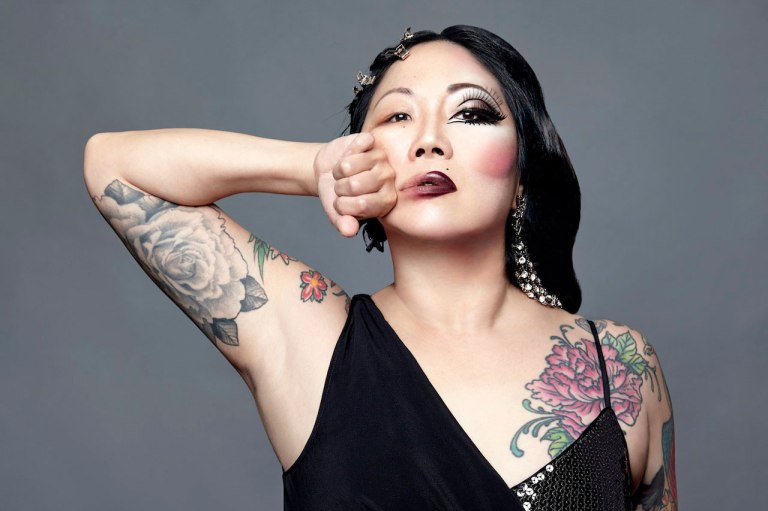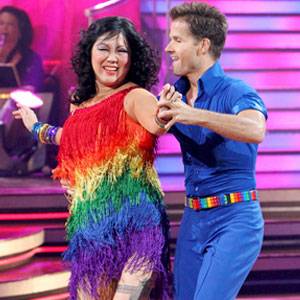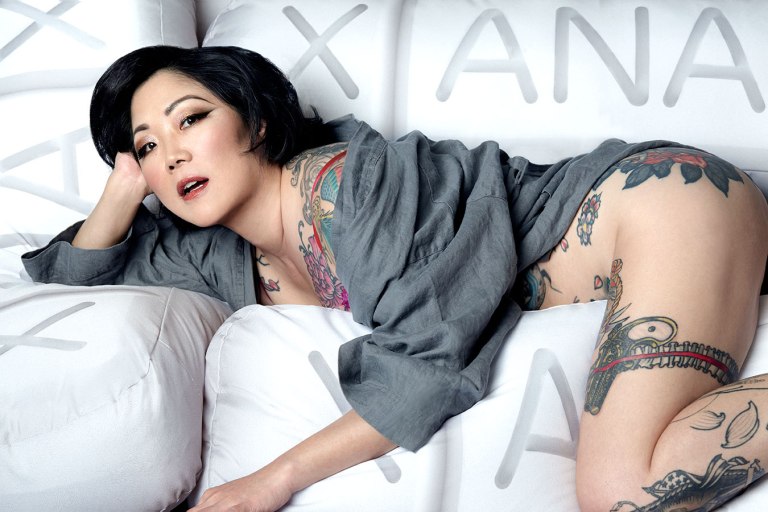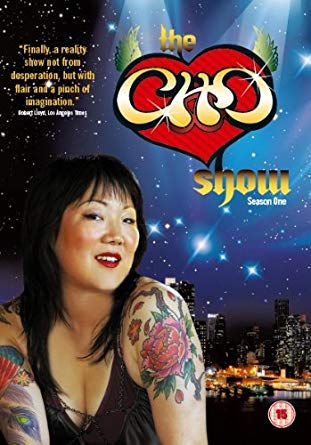
Biography: A Long Road to Self-Love
Margaret Cho was born as Moran Cho in 1968. Her parents immigrated to America from Seoul, South Korea in 1964 and her father briefly returned there with Margaret after he was deported for working while under a student visa. (1) Both Margaret and her parents moved to the Castro district of San Francisco soon after.
While Margaret’s father studied law in Korea, he was forced to support his family by waiting tables and working as a janitor. Later, Margaret’s parents opened a bookstore in the Castro district, a location that was formative in Margaret’s youth. (1)
“I’m the only member of my family to have been born in America, so my mother would always push me forward like, ‘She’s white!'” – Cho on her life as an Asian American (1)

Pictured: Margaret posing with her mother in the early 1970’s
Warning: This section deals with sexual and emotional abuse. In telling the story of Margaret’s life, it is important to remember that she triumphed over the adversity she experienced. She went through a lot of shit, so buckle your seatbelts and keep in mind that she is now stronger than ever.
In her one-woman show and biography titled I’m the One that I Want, Cho describes her childhood as one marred by abuse and trauma. She was relentlessly bullied by her peers at school, who often called her “Moron” instead of “Moran.” At one summer camp, her fellow campers filled her sleeping bag with rocks, dirt, and poop. Feeling betrayed by her friends, she refused to go to any church functions after the incident. Likely targeted due to her “otherness,” she became embarrassed of her Korean heritage. (2)
“I may have been about 10 or something, and I thought I needed a white name. Like, I need an American name. Like, I need a name that people would somehow be able to say.” – Cho on why she prefers to be called Margaret (1)
Unfortunately, Margaret’s difficult childhood was further darkened by familial abuse. Her mother would often comment on her weight, calling her “fat.” A family friend molested her for years, and she was again raped at age 14 (3). Additionally, when Margaret was expelled from school at 15 for failing grades, her parents told her that they hated her because she was a “failure at everything.” (2)
Cho, who still lived in the Castro district, often found herself curious of the gay culture surrounding her. Her friendships with gay men were and continue to be particularly important to her and she calls herself a “fag hag”- a woman who loves gay men’s company. This early exposure to the gay community likely contributed to Cho’s LGBTQ advocacy later in life. (2)
“Homosexuality brought me back to men, made me see they could be trusted, and even loved. I’ve never stopped feeling this way.” – Cho on her love of gay men (2)
After she was expelled, Cho joined a theater program hosted by a local college. This led to her audition at a local School of the Arts, where she performed a piece from Elizabeth Swados’ Runaways. She was admitted to the class of ’87, and soon joined an improv group called Batwing Lubricant (2).
“Being in front of an audience was a natural, easy thing. For the first time in my life, I knew exactly what I was doing.” – Cho on performing high school improv (2)
“I wanted to be a comedian very early in life. I told my mother when I was fourteen that I was gonna be a comedian and she said ‘Oh! Maybe it’s better if you just die.'” – Cho on her family’s reaction to her desire to perform (1)
Cho dropped out of high school at age 17, due to bullying and the death of a favorite teacher who was killed for being gay (3). She was also heavily using drugs at the time, a habit that continued into adulthood (2). She used comedy as an escape from the trauma and addiction present in her life, and it worked- “at least in the beginning.” (2)
After a trip to Europe, Cho spent the rest of her teens performing stand up comedy in San Francisco. To support her “comedy habit,” she worked in her parents’ bookstore and as a phone sex operator (2). At this time, she entered a contest where the best performers would win the right to open for Jerry Seinfeld. After she won and performed the set, he encouraged her to drop what she was doing to pursue comedy. She soon moved to Los Angeles began touring on the college circuit, performing over 300 concerts in two years. She was introduced to television by Arsenio Hall, and after a Bob Hope primetime special, she became nationally known (4).

Pictured: Cho with Dave Chappelle in 1991
Cho became popular for her unique comedic style. She was outspoken on taboo topics like sex and drugs, even imitating sexual acts on stage. Her routines were and continue to be politically outspoken as well, and her feminist, anti-racist, and pro-LGBTQ values were quite unusual for her time. She also often portrayed her Korean family in her sets, much to the delight of audiences.
“What I like to do is kind of a highbrow lowbrow thing where I talk about politics and I talk about race and you know, religion, and, you know, get really into queer politics and then I just get real dirty jokes.” – Cho on her comedic style (5)
In 1992, Cho left L.A. for a national stand-up comedy tour. This proved to be incredibly emotionally and physically taxing for her. Her drug and alcohol use continued during this time, taking an even deeper toll.
“I went to hell and back in the name of comedy. There were small signs that I was starting to go insane. I rarely changed clothes or showered, sometimes for as long as two weeks. Sleeping in what I wore all day, pulling my greasy hair up with a Goody barrette, thinking it didn’t matter, nothing mattered, because nobody cared.” – Cho describing her 1992 national tour (2)
In 1994, Cho was given a sitcom by ABC. Titled All-American Girl, the show focused on a Korean family trying to integrate into America. While Cho was a outspoken raunchy liberal, the show’s producers wanted her to “tone down” her personality so as not to offend viewers. She was also not given a chance to write for the show (2). Because ABC feared that the show would be “too ethnic,” the result was a watered-down sitcom with stale jokes. With little popularity and criticism from the Korean community, the show only lasted one season (2, 4).

Pictured: a promotional image for All American Girl
The most alarming problem with All-American Girl occurred behind the scenes. After her screen test for the show, Cho was told by ABC that she needed to lose weight before the show could be filmed. While Cho’s manager Karen advised Cho to quit the show, Cho decided to stay and fired Karen. The network set her up with a personal trainer, who made Cho work out every day for four hours. Her diet was extremely limited and she began taking diet pills. She lost 30 pounds in two weeks and was hospitalized with kidney failure (2).
“All American Girl certainly hadn’t saved me, it just plunged me further into the abyss.” – Cho on the failure of her sitcom (2)
After the failure of her sitcom, Cho began to spiral. She continued abusing drugs and diet pills but continued performing stand up. During this time, she would appear onstage drunk. There were times when she was booed of f the stage, leaving her humiliated. This dark period of her life continued for several years, but ended when she broke up with her then-boyfriend and reunited with her old manager, Karen. This breakthrough allowed Cho to begin the journey of learning to love herself (2).
“I believe that when you take those first steps in loving yourself, the universe conspires with your soul to keep that love affair going.” – Cho on self-love (2)
Karen helped Cho book shows at clubs and colleges throughout the country in the late 90’s. During this time Cho wrote and produced a sketch comedy show called “The People Tree.” With her career risen from the dead, Cho decided to take a risk- to tell the story of her painful childhood, her time on All American Girl, and her struggles with drug and alcohol abuse.
In 1999, Cho debuted her off-Broadway one-woman show called I’m the One That I Want. The show dealt with Cho’s past trauma with “enough emotional distance” to keep audiences laughing instead of crying. The show was a smash-hit, with a forty city tour that was sold-out at every venue. The show was then made into a film and book, which I have relied on heavily to tell Cho’s story (2).
After the success of I’m the One That I Want, Cho continued touring nationally. In 2001, she performed the Notorious C.H.O tour, which was also made into a film. In 2003, she performed her national tour Revolution, which was nominated for a Grammy. In 2005, she released the album Assassain. Two years later, she joined stars such as Cyndi Lauper on the True Colors Tour, which benefited the Human Rights Campaign. Later that year, she created and starred in a live variety show called The Sensuous Woman (4).
In 2008, VH1 released The Cho Show, an outrageous and feminist show that dealt with risque topics such as anal bleaching. Cho’s parents even appeared on the show, such as in its first episode, “Korean of the Year.” Though the show only aired for one season, Cho felt that it was “the closest I’ve been able to come on television to what I do as a comic,” (4).
“I was, you know, doing my first screen test and I wore this little midriff shirt on my test. And the network freaked out and they’re like “Oh my god. Never bare your stomach in public again. You are so fat. So, now in my new show, I’m naked in every episode so they can see my ass and kiss it.” – Cho on the body negativity on All American Girl versus the body positivity present in The Cho Show (5)
Later that year, Cho began her Beautiful tour. In the film version of the show, feminist values regarding beauty and race are clear. In it she critiques Sarah Palin for homophobic remarks and then suggests that she would like to have sex with her, a clear example of the comic’s connection to the political and obscene (5).
“And I hate how she says she tolerates gays. I hate that when people fucking tolerate gays. Oh fuck you. Fucking tolerating gays. One night with me and you will be riding sidesaddle with the Dykes on Bikes.” – Cho on Sarah Palin (5)

In 2009, Cho starred in a dramedy on Lifetime called Drop Dead Diva, which ran for six seasons. Cho describes the experience as fulfilling because it allowed her to express her feminist values (4). Later that year, Cho appeared on Dancing with the Stars. Though she was voted off early in the show, she made waves for wearing a rainbow LGBTQ pride dress on a network show that was seen as conservative (4). Though the network assured viewers that the dress was not a gay flag, Cho’s own biography says otherwise.
Pictured: Cho’s pride flag dress on Dancing with the Stars
In 2010, Cho’s album Cho Dependent was nominated for a Grammy. The album contains Cho’s usual stand up, but also contains funny songs. This was a milestone for women in comedy, as Cho was one of the first women to ever release a musical comedy album (4). Some of these songs even came with music videos, such as “Eat Shit and Die.”
In 2012, Cho released MOTHER, a comedy album about queer motherhood. She was also nominated for an Emmy for her guest performance as Kim Jong Il on 30 Rock.
In recent years, Cho has continued to perform comedy while also breaking away from the medium to explore other passions. She was a host on TLC’s All About Sex, she released a comedy album called psyCHO, a studio album called Cho Dependent, and released several music videos including one called “(I Want To) Kill My Rapist.” (4)
Cho has won several awards for her anti-racism, anti-homophobia, and anti-racist campaigns. She won the “First Amendment Award” from the American Civil Liberties Union, the “Intrepid Award” from the National Organization for Women, and has been honored by American Women in Radio and Television, the National Gay and Lesbian Task Force, LA Pride, and the Asian American Legal Defense and Education Fund (4).
Though she has had a difficult life, Margaret Cho has overcome it all to become one of the funniest and most feminist women in comedy. She preaches self-love and uses her experiences to inform her comedy, which can be political, dark, light, or lewd. Honestly, what a badass.
“What does it take for us to start to value ourselves? I believe it begins with talking about it, sharing the pain, shedding light on it, so like shadows, it fades away in the brightness.” – Cho on self-love (2)

Cho’s Experiences as a Woman in Comedy:
Cho’s experiences as a woman in comedy are unique in that she was the first mainstream Asian American woman to perform in the medium. The intersection of her race and gender played a big role in how she was treated throughout her career, particularly after she moved to Hollywood.
“All my comic friends seemed to be able to do whatever they wanted. Having to factor in the color of my skin whenever I tried to do anything really frustrated me. It’s not that I was ashamed of my background, but that was all anybody could see at first. That was the real difference between performing stand-up in the clubs and trying to make it in L.A.” – Cho on early difficulties related to race (2)

Pictured: Cho bucking societal norms regarding the female Asian body by posing almost fully nude with tattoos and what I would describe as a “human” figure
“Of course, the few times I got heckled it was race related… but there is nothing a good “Do I go to where you work and slap the dick out of your mouth?” can’t fix. Now, in L.A., there were no clever comebacks, because there were no opportunities for them.” – Cho on racism in the comedy industry (2)
While many male comedians were allowed to be much heavier than Cho ever was, her status as a woman in Hollywood meant that she was expected to be extremely thin. She was criticized by her own network and told to lose weight during All American Girl, and was criticized by viewers for not being a traditionally thin Asian woman. Even Cho’s friend and mentor Joan Rivers once told Cho that she would “die” if Cho gained any more weight. This criticism wore on Cho for many years until she went through the difficult process of learning to love her body and herself (2).
Impacts and Influences:
“One of my earliest memories is the day I realized I was not white, and therefore not like the people I saw on TV.” – Cho on a lack of racial diversity in her childhood (2)
In Cho’s childhood, there were very few representations of Asian women on television. With her sitcom All-American Girl, Cho starred in the first Asian-American family sitcom. Though the show drew criticism from the Korean community for not casting Korean actors, it remains influential in that it helped to normalize Asians on television. The show can also be tied directly to Fresh Off the Boat, a successful Asian-American sitcom that aired from 2015 to the present. In fact, Cho was consulted to help create the show (4).
Cho’s choice to openly discuss her battles with body image, sexism, racism, rape, drug abuse, and depression had a major impact on audiences and fellow performers. Frank discussion of such taboo subjects helped to open the door for other comedians to talk about their struggles, making Cho’s openness revolutionary.
“I met people over the entire summer who told me they loved the show. So many women who also worked in the entertainment field said they had gone through similar experiences, and they hadn’t had the courage to talk about it. They thanked me for my honesty and strength.” – Cho on audience reactions to I’m the One That I Want (2)
Cho’s frank description and depiction of overt sexuality also opened the door for other female comedians, such as Amy Schumer, to do “blue” comedy.
Margaret Cho and Feminism:
Cho has always been an outspoken feminist, with anti-racist and anti-homophobia values playing an important role in her beliefs. She is a supporter of the Me Too movement, and she hopes that her discussion of her own sexual abuse will help to empower other victims (3). She points out sexism wherever she sees it, not shying away from being a “bitchy feminist” during her shows.
In I’m the One that I Want, Cho describes her own sexism in firing her female manager, Karen in favor of male representation. By sharing this story of her own sexism, she reminds us that we too must look within ourselves to recognize and correct sexism.
“It is horrifying to acknowledge the sexism within yourself, because then you see the enemy is not in front of you, but behind your own eyes… The reason I didn’t feel worthy of the love and support Karen gave me was because she was a woman, and I couldn’t trust her. I had grown up with the idea that while women may make strides without men, they could only do the real work with them.” (2)
Cho’s commitment to the LGBTQ community is also clear.
“I think it’s very important to feel beautiful. I think it’s very political to feel beautiful, especially if you’re queer. Because if you’re queer, you have to take on the world every single day of your life. So you have to feel beautiful to survive.” – Cho on surviving as queer (5)
Cho’s frank discussion of sexuality aligns itself with wit sex positive feminism, and she destroys societal expectations of Asian women by discussing and depicting sexuality on stage. She is an advocate for body positivity as well.
“Fat is still a feminist issue. Weight is not just about our bodies. It’s how we feel about ourselves. It affects every decision we make. The status quo would like you to think of it as a petty, unimportant thing, to make fun of it like it is a ridiculous, female obsession, a weakness. It is one of their greatest weapons. Don’t become a casualty. The war is almost over, and we are going to win.” – Cho on body positivity (2)

Works Cited
(1) Gates, Henry Louis. “Finding Your Roots.” Season 1, episode 8, PBS, 2012.
(2) Cho, Margaret. I’m the One That I Want. Ballantine Books, 2002..
(3) “Margaret Cho Opens Up About Her Experience with Rape, Abuse: ‘Sharing the Suffering Alleviates the Burden’.” PEOPLE.com, 2015, people.com/tv/margaret-cho-opens-up-about-her-experience-with-rape-abuse/.
(4) “Margaret Cho Biography.” Margaret Cho Official Site, margaretcho.com/bio/.
(5) Machado, Lorene, director. Margaret Cho: Beautiful. HBO, 2009.
(Photo One Credit: http://margaretcho.com/bio/)
(Photo Two Credit: https://people.com/tv/margaret-cho-opens-up-about-her-experience-with-rape-abuse/)
(Photo Three Credit: http://margaretcho.com/photos/old-photos-from-a-box-in-my-room/)
(Photo Four Credit: https://next-episode.net/all-american-girl)
(Photo Five Credit: https://www.amazon.com/The-Cho-Show-DVD/dp/B0062NARQ6)
(Photo Six Credit: https://www.eonline.com/news/204961/margaret-cho-s-rainbow-dress-that-was-not-a-gay-flag-says-dwts-partner)
(Photo Seven Credit: http://margaretcho.com/bio/)
(Photo Eight Credit: http://margaretcho.com/bio/)
(Photo Nine Credit: http://margaretcho.com/bio/)

